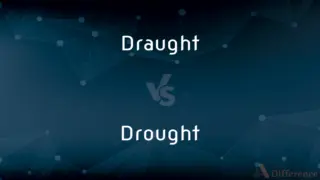Accent vs. Inflection — What's the Difference?
By Tayyaba Rehman & Maham Liaqat — Updated on April 23, 2024
An accent refers to distinctive pronunciations characteristic of a specific region, while inflection involves the modulation of tone or pitch in speech to convey meaning or emotion.

Difference Between Accent and Inflection
Table of Contents
ADVERTISEMENT
Key Differences
An accent is a manner of pronunciation specific to a particular individual, location, or nation, influencing how words are pronounced. On the other hand, inflection is about the variations in pitch, tone, and volume that help convey grammatical information or emotional expression.
Accents are largely about differences in sound that distinguish one speaker's dialect from another, often tied to geographical or social backgrounds. Whereas inflections are used across languages to indicate changes in verb tense, question formation, or to emphasize a particular word in a sentence.
The presence of an accent can reveal a speaker’s regional or cultural background, as it involves specific phonetic traits. Inflection, however, transcends regional boundaries, focusing instead on how changes in voice pitch and tone influence meaning within any language.
While accents remain relatively consistent in a person’s speech and are more static, inflections can vary dramatically even within a single sentence based on the speaker’s emotions or the sentence's structure.
Learning a new language might require understanding and mimicking a specific accent to sound native, while mastering inflections is crucial for proper intonation and grammatical accuracy in that language.
ADVERTISEMENT
Comparison Chart
Efinition
Distinctive pronunciation from a region
Modulation of voice to express meaning
Primary Function
Indicates geographical or social origin
Conveys grammatical or emotional information
Variation
Consistent in an individual’s speech
Varies with emotion or grammatical needs
Examples
British accent, American accent
Question inflection, emotional emphasis
Relevance
Important for regional dialect recognition
Crucial for effective communication in any language
Compare with Definitions
Accent
Associated with a particular region, nation, or social group.
Her accent reveals she's from the South.
Inflection
Tone adjustments in speech for clarity or effect.
The teacher's inflection helped students understand the concept.
Accent
The characteristic speech patterns of a community.
The local accent was thick and melodic.
Inflection
A change in the form of a word to express grammatical functions.
In English, voice inflection often indicates a question.
Accent
Phonetic traits that identify the speaker's background.
His accent marks him as a native French speaker.
Inflection
Expressive modulation used to convey emotions.
Her excitement was evident in the inflection of her voice.
Accent
A distinctive mode of pronunciation of a language.
He has a strong British accent.
Inflection
The modulation of tone or pitch in the voice.
She used inflection to emphasize her point.
Accent
A way of speaking that differentiates people by geography.
Moving from Australia to the U.S., his accent stood out.
Inflection
Variation in speech patterns to express mood or tense.
His voice inflection softened as he spoke more tenderly.
Accent
The relative prominence of a particular syllable of a word by greater intensity or by variation or modulation of pitch or tone.
Inflection
In linguistic morphology, inflection (or inflexion) is a process of word formation, in which a word is modified to express different grammatical categories such as tense, case, voice, aspect, person, number, gender, mood, animacy, and definiteness. The inflection of verbs is called conjugation, and one can refer to the inflection of nouns, adjectives, adverbs, pronouns, determiners, participles, prepositions and postpositions, numerals, articles etc., as declension.
Accent
Vocal prominence or emphasis given to a particular syllable, word, or phrase.
Inflection
The act of inflecting or the state of being inflected.
Accent
One determined by the regional or social background of the speaker.
Inflection
Alteration in pitch or tone of the voice.
Accent
One determined by the phonetic characteristics of the speaker's native language carried over to that speaker's use of another language.
Inflection
An alteration of the form of a word by the addition of an affix, as in English dogs from dog, or by changing the form of a base, as in English spoke from speak, that indicates grammatical features such as number, person, mood, or tense.
Accent
A mark or symbol used in the printing and writing of certain languages to indicate the vocal quality to be given to a particular letter
An acute accent.
Inflection
An affix indicating such a grammatical feature, as the -s in the English third person singular verb form speaks.
Accent
A mark or symbol used in printing and writing to indicate the stressed syllables of a spoken word.
Inflection
The paradigm of a word.
Accent
Rhythmically significant stress in a line of verse.
Inflection
A pattern of forming paradigms, such as noun inflection or verb inflection.
Accent
Emphasis or prominence given to a note or chord, as by an increase in volume or extended duration.
Inflection
A turning or bending away from a course or position of alignment.
Accent
A mark representing this.
Inflection
Change in the form of a word (morphologic change) to express different grammatical categories.
In English, word order often does the work that inflection did in Latin
Accent
A mark used as a superscript to distinguish among variables represented by the same symbol.
Inflection
An instance of such change.
An inflection for gender, number, or tense
Accent
A mark used as a superscript to indicate the first derivative of a variable.
Inflection
(grammar) An affix representing such an instance.
English's regular inflection for number in plural nouns is the suffix -s.
Accent
A mark or one of several marks used as a superscript to indicate a unit, such as feet (′) and inches (") in linear measurement.
Inflection
Any form produced by such an instance of a change, such as the principal parts for any given stem: any of the declined or conjugated forms that constitute its declension or conjugation.
Recite every inflection for each of these words.
Accent
A distinctive feature or quality, such as a feature that accentuates, contrasts with, or complements a decorative style.
Inflection
A change in pitch or tone of voice.
If he's lying, his inflection changes.
Accent
Something that accentuates or contrasts something else, as a touch of color that makes the features of an image stand out.
Inflection
(mathematics) A change in curvature from concave to convex or from convex to concave.
Accent
Particular importance or interest; emphasis
The accent is on comfort.
Inflection
A turning away from a straight course.
Inflection from the rules
Accent
To stress or emphasize the pronunciation of
Accented the first syllable in “debacle.”.
Inflection
(optometry) Diffraction.
Accent
To mark with a printed accent.
Inflection
The act of inflecting, or the state of being inflected.
Accent
To focus attention on; accentuate
A program that accents leadership development.
Inflection
A bend; a fold; a curve; a turn; a twist.
Accent
(linguistics) A higher-pitched or stronger (louder or longer) articulation of a particular syllable of a word or phrase in order to distinguish it from the others or to emphasize it.
In the word "careful", the accent is placed on the first syllable.
Inflection
A slide, modulation, or accent of the voice; as, the rising and the falling inflection.
Accent
(figuratively) Emphasis or importance in general.
At this hotel, the accent is on luxury.
Inflection
The variation or change which words undergo to mark case, gender, number, comparison, tense, person, mood, voice, etc.
Accent
(orthography) A mark or character used in writing, in order to indicate the place of the spoken accent, or to indicate the nature or quality of the vowel marked.
The name Cézanne is written with an acute accent.
Inflection
Any change or modification in the pitch or tone of the voice.
Accent
Modulation of the voice in speaking; the manner of speaking or pronouncing; a peculiar or characteristic modification of the voice, expressing emotion; tone.
Inflection
Same as Diffraction.
Accent
The distinctive manner of pronouncing a language associated with a particular region, social group, etc., whether of a native speaker or a foreign speaker; the phonetic and phonological aspects of a dialect.
A foreign accent
A broad Irish accent
A hint of a German accent
Inflection
A change in the form of a word (usually by adding a suffix) to indicate a change in its grammatical function
Accent
A manner of pronunciation suggesting that the speaker is from a different region; a foreign accent.
My professor's accent is so thick that it's difficult to understand her lectures.
She spoke with a strong accent that betrayed her southern roots.
I was surprised to learn that he was an immigrant, as he spoke without any accent.
Inflection
The patterns of stress and intonation in a language
Accent
(sign languages) A distinctive manner of producing a sign language, such as someone who does not normally use a certain sign language might have when using it.
Inflection
Deviation from a straight or normal course
Accent
A word; a significant tone or sound.
Inflection
A manner of speaking in which the loudness or pitch or tone of the voice is modified
Accent
Expressions in general; speech.
Accent
Stress laid on certain syllables of a verse.
Accent
(music) A regularly recurring stress upon the tone to mark the beginning, and, more feebly, the third part of the measure.
Accent
(music) A special emphasis of a tone, even in the weaker part of the measure.
Accent
(music) A mark used to represent this special emphasis.The third and fourth symbols are accents (marks used to represent special emphasis in music).
Accent
(music) The rhythmical accent, which marks phrases and sections of a period.
Accent
(mathematics) A prime symbol.
Accent
Emphasis laid on a part of an artistic design or composition; an emphasized detail, in particular a detail in sharp contrast to its surroundings.
Accent color
Accent
A very small gemstone set into a piece of jewellery.
Accent
(archaic) Utterance.
Accent
(transitive) To express the accent of vocally; to utter with accent.
Accent
(transitive) To mark emphatically; to emphasize; to accentuate; to make prominent.
Accent
(transitive) To mark with written accents.
Accent
A superior force of voice or of articulative effort upon some particular syllable of a word or a phrase, distinguishing it from the others.
Accent
A mark or character used in writing, and serving to regulate the pronunciation; esp.: (a) a mark to indicate the nature and place of the spoken accent; (b) a mark to indicate the quality of sound of the vowel marked; as, the French accents.
Accent
Modulation of the voice in speaking; manner of speaking or pronouncing; peculiar or characteristic modification of the voice; tone; as, a foreign accent; a French or a German accent.
The tender accent of a woman's cry.
Accent
A word; a significant tone
Winds! on your wings to Heaven her accents bear,Such words as Heaven alone is fit to hear.
Accent
Stress laid on certain syllables of a verse.
Accent
A regularly recurring stress upon the tone to mark the beginning, and, more feebly, the third part of the measure.
Accent
A mark placed at the right hand of a letter, and a little above it, to distinguish magnitudes of a similar kind expressed by the same letter, but differing in value, as y´, y.
Accent
To express the accent of (either by the voice or by a mark); to utter or to mark with accent.
Accent
To mark emphatically; to emphasize.
Accent
Distinctive manner of oral expression;
He couldn't suppress his contemptuous accent
She had a very clear speech pattern
Accent
Special importance or significance;
The red light gave the central figure increased emphasis
The room was decorated in shades of gray with distinctive red accents
Accent
The usage or vocabulary that is characteristic of a specific group of people;
The immigrants spoke an odd dialect of English
He has a strong German accent
Accent
The relative prominence of a syllable or musical note (especially with regard to stress or pitch);
He put the stress on the wrong syllable
Accent
A diacritical mark used to indicate stress or placed above a vowel to indicate a special pronunciation
Accent
To stress, single out as important;
Dr. Jones emphasizes exercise in addition to a change in diet
Accent
Put stress on; utter with an accent;
In Farsi, you accent the last syllable of each word
Common Curiosities
What is the role of accent in language?
An accent helps identify a speaker's regional, national, or social background based on their pronunciation.
Can a person's accent change?
Yes, a person's accent can change or be modified through exposure to different languages or regions.
Why is inflection important in speech?
Inflection is important because it provides additional information that can help clarify meaning and express emotional nuances.
How does inflection aid communication?
Inflection aids communication by allowing speakers to convey nuances in meaning, emotional intent, and grammatical distinctions.
Can inflection change the meaning of a sentence?
Yes, changing the inflection can alter the meaning or perceived intent of a sentence, such as turning a statement into a question.
Do all languages use inflection?
Most languages use some form of inflection, though the extent and nature of inflectional changes vary widely.
Is inflection the same across languages?
While the concept of inflection is universal, the specific uses and rules vary significantly across different languages.
How does one learn to use inflections appropriately in a new language?
Learning inflections in a new language typically involves listening to native speakers and practicing speech to mimic the tone and pitch variations.
How does accent influence social perceptions?
Accents can influence social perceptions by invoking stereotypes associated with certain regions or groups.
What differentiates accent from dialect?
An accent refers specifically to differences in pronunciation, while a dialect includes variations in grammar, vocabulary, and pronunciation.
Are inflections learned or innate?
Inflections are generally learned through exposure to language and are influenced by social interactions.
What impact does a strong accent have on understanding?
A strong accent can sometimes hinder understanding for listeners who are not familiar with the pronunciation patterns of that accent.
What are common errors made with inflection by non-native speakers?
Common errors include incorrect intonation patterns that can confuse the meaning of sentences or questions.
How can one reduce their accent?
Reducing an accent generally involves speech training and practice to adjust pronunciation to a different standard.
What is an example of inflection affecting word function?
An example is using inflection to turn a statement, "You are going," into a question, "You are going?" merely by changing the tone at the end.
Share Your Discovery

Previous Comparison
Draught vs. Drought
Next Comparison
Device vs. EquipmentAuthor Spotlight
Written by
Tayyaba RehmanTayyaba Rehman is a distinguished writer, currently serving as a primary contributor to askdifference.com. As a researcher in semantics and etymology, Tayyaba's passion for the complexity of languages and their distinctions has found a perfect home on the platform. Tayyaba delves into the intricacies of language, distinguishing between commonly confused words and phrases, thereby providing clarity for readers worldwide.
Co-written by
Maham Liaqat















































